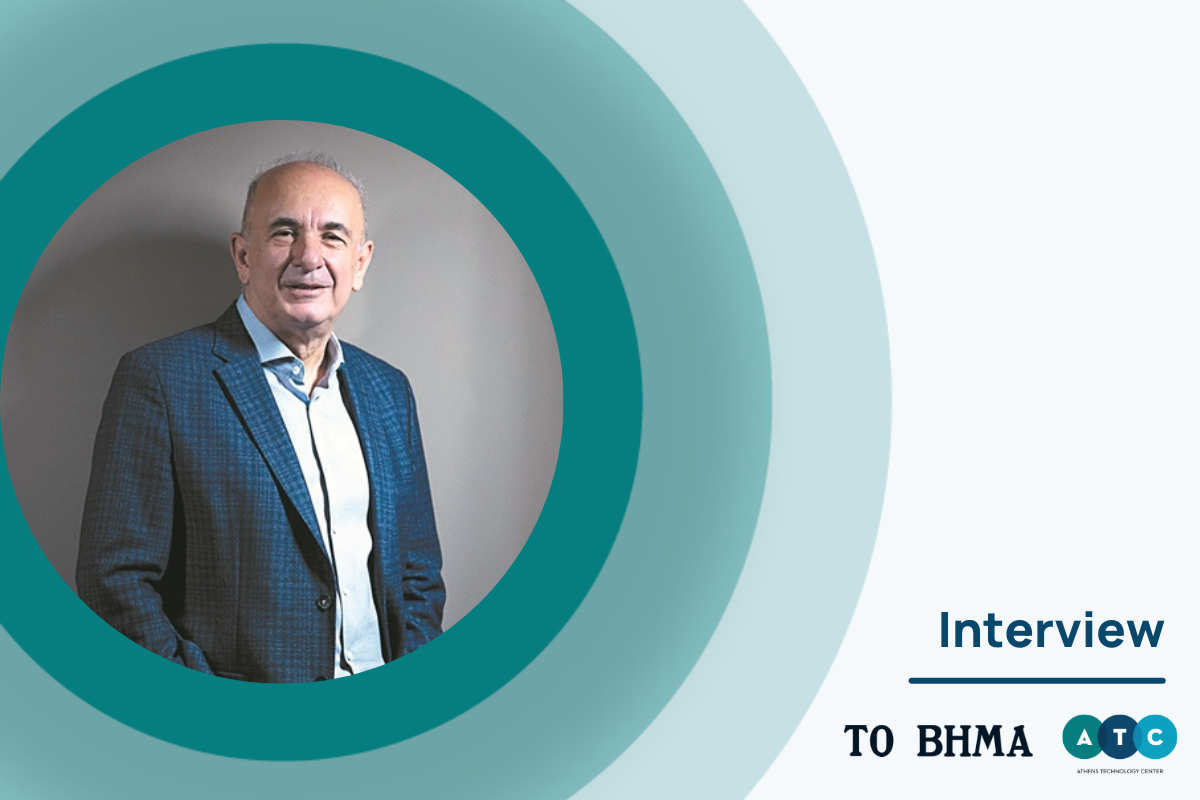On the occasion of ATC’s recent rebranding, the greek newspaper To Vima (Greek: Το Βήμα, lit. ’The Tribune’) hosted an interview of Yannis Kliafas, ATC’s General Manager.
Yet, the discussion went far beyond just logos, exploring what’s ATC view on the current business challenges and the company’s contribution to the future.
Q. You recently announced your new corporate identity, which has received many positive feedback!
Y.K. : Thank you very much! Indeed, we need this, to communicate even more effectively our corporate core: a company that draws strength and expertise from more than 30 years of experience in software development, and still maintains a youthful spirit, for research and innovation!
So we set a new motto, the “Smart Business Enabler”, to emphasize the fact that we utilize the latest technologies to fully meet the contemporary needs of private and public sector organizations worldwide, focusing on both vertical markets such as the Media, Manufacturing and Banking, but also in horizontal sectors such as Human Capital Management, Corporate Newsroom, Big Data Analytics and Custom Software Development!
Q. But how do you combine a wide range of potential customers with an ever-changing technology landscape?
Y.K. : Indeed, technological developments occur at an exponential pace. Accordingly, the role of a technology company like ours gets more difficult. So, we have to closely monitor all new developments and incorporate them timely in our solutions, in order to keep them constantly at the forefront.
We are guided by the agility to transfer the technology and its functionalities to more than one fields, i.e. creating more than one use cases. In this way, we capitalize on knowledge and serve a wider range of organizations.
For example, we have extensive experience in content aggregation, management and distribution platforms, successfully supporting leading news agencies and news organizations around the world. Thus, inspired by the strategic choice of brands to operate as publishers, we propose the adoption of a newsroom model even in “traditional” business environments, to meet the needs of the press office, the communication department, etc.
In addition, we aim to provide value that actually matters.
At ATC, we are very proud of our staff, which combines extended know-how alongside with advanced soft skills. This allows us to understand the pain points and the business logic of each client in depth, and finally, to suggest the appropriate options based on the client’s budget, always aiming to an optimal RoI. For example, we work with Epicor, one of the largest enterprise resource management software (ERP) companies in the world, to ensure that the greek manufacturing industry will adapt seamlessly to the Industry 4.0 challenges.
Q. But the 4th Industrial Revolution is not just about a factory’s production process. Right;
Y.K. : Indeed. Modern technologies can radically transform companies across the full spectrum of their operations. Through the utilization of data, each company can take appropriate actions in order to enhance its operational efficiency and continuously improve customer and partner experience. In fact, recently, we served a large multinational pharmaceutical company with data analytics as a service, helping it to transfer the insights deriving from big data analytics even in the lower hierarchy levels, in an easy and fast way.
Of course, every operational change has to align with the corresponding development of the executive potential of a company.
If there is no internally integrated, approach in the field of learning and talent management, then new tech tools will not be properly exploited.
Meanwhile, Industry 4.0 obviously does not only affect the private sector. At ATC, we have been serving Greek public bodies for years, designing and developing integrated custom software solutions and services.
Q. I can not help but ask you – what do you see happening with the pandemic and all?
Y.K.: The Covid19 pandemic has highlighted more than ever the priorities that an organization must set if it wants to continue to be operational. “Modernization” doesn’t start or end by e.g. the transition to the cloud; most importantly, it relates to the change in the day-to-day operations and to the expectations that are built, from the benefits and challenges that a “distributed” collaboration model brings forward. And personally, I think. that this model will stay with us; after all, it’s cheaper, let’s not forget that.
At ATC, however, nothing really changed; being remote is a common practice for us, since we were already working with many customers based on other continents . In fact, we took advantage of this time to invest in building “influence” for our target markets, through synergies, know-how exchange and mentoring.
Q. You previously mentioned ATC’s long experience in media industry. What is your vision for the future of this market?
Y.K. : It seems misinformation is the biggest challenge that the sector is already experiencing Our long-term experience in the media, helped us to recognize this critical issue in good time; hence, we collaborated with Deutsche Welle to develop a collaborative platform for the verification of user generated content. This platform, is trusted by key organizations such as Reuters and Amnesty International. At the same time, the European Commission (EU) has entrusted us to create the first core service of a digital platform to help fighting disinformation in Europe. To this end, we are already working on the capabilities provided by artificial intelligence algorithms to detect and identify such incidents. We are also developing audioforensic tools to identify deepfakes.
Last but not least, we are exploring the potential of blockchain in copyright management and the new dynamics rising by robot and explanatory journalism.
The interview was published on Sunday, April 25th.
Read the interview online!





